Dungeon Master-AI-powered RPG storytelling tool
AI-driven adventure awaits!
Start
Begin
Lets play
Commence
Related Tools
Load More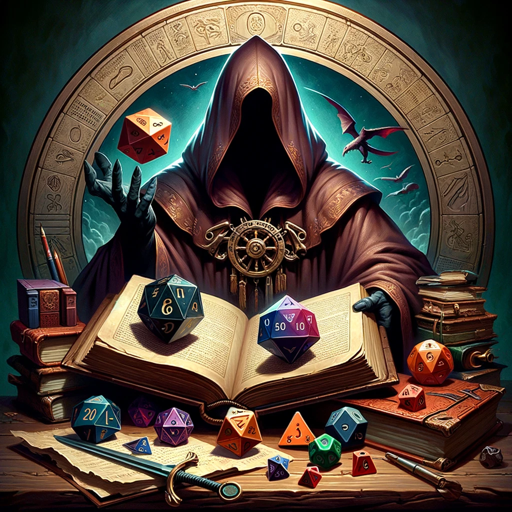
The Dungeon Master
Expressive, dramatic Dungeon Master

dungeons and dragons DnD
Your trusty companion for imaginative storytelling and expert rule guidance in Dungeons and Dragons.
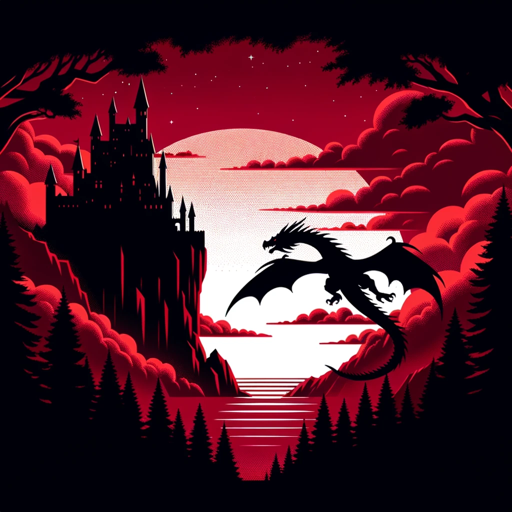
Dungeon Master GPT
A Dungeons and Dragons DM
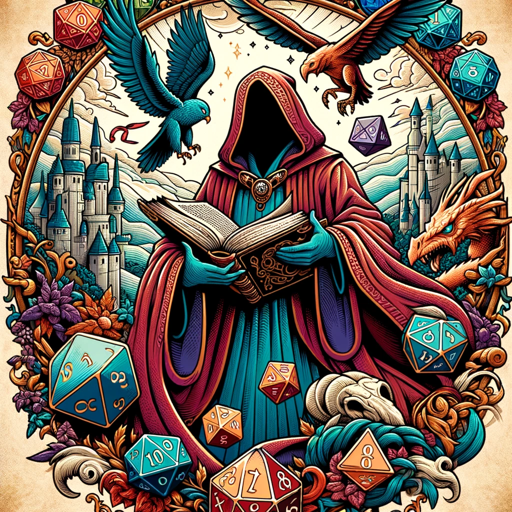
Dungeon Master
Your personal Dungeon Master for single player DnD 5e adventures. Upload an adventure or let the DM improvise one!
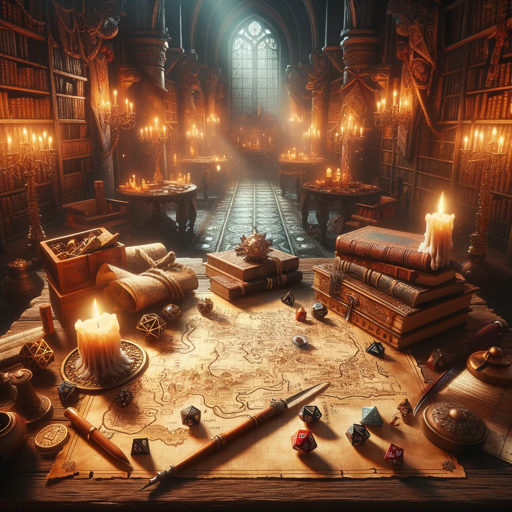
Dungeon Master
Play Dungeons and Dragons with your very own AI Dungeon Master | Prompt "lets start our adventure" to get started and feel free to ask it for any images you wish to see along your journey!

The Dungeon Master
Your immersive DnD guide & artist
20.0 / 5 (200 votes)
Introduction to Dungeon Master
The Dungeon Master (DM) is the central figure in any Dungeons & Dragons (D&D) game session, responsible for guiding the narrative, managing the rules, and maintaining the flow of the game. The DM controls the world, setting the scene, narrating events, and portraying the non-player characters (NPCs) that players encounter. One of the DM's primary functions is to adapt to player choices, ensuring the story remains dynamic while adhering to the game’s rules and mechanics. In this capacity, the DM balances storytelling with game mechanics to create a rich, interactive experience. For example, in a scenario where the player characters (PCs) are exploring an ancient ruin, the DM sets the atmosphere by describing the eerie silence and crumbling walls. When a player triggers a trap, the DM rolls for outcomes and describes the consequences—perhaps a pitfall or a sudden ambush. In this way, the DM not only facilitates the game mechanics but also breathes life into the fantasy world. The DM also manages challenges such as combat, puzzle-solving, and decision-making. For instance, during combat, the DM tracks enemy health, movements, and actions while ensuring players follow the rules for attacking, spellcasting, and defending. Outside of combat, they may present moral dilemmas or complex puzzles, guiding the players toward meaningful choices that shape the game world.

Core Functions of a Dungeon Master
Narration and Storytelling
Example
The DM describes the setting, events, and NPC actions, shaping the world based on player decisions. For example, if the players enter a dense, enchanted forest, the DM might describe the eerie glow of magical creatures and the unnerving silence that hangs in the air.
Scenario
In a quest to retrieve an ancient artifact, the DM introduces the players to a treacherous swamp filled with hidden dangers. As they navigate the area, the DM presents vivid descriptions of each encounter, adjusting the plot as players make choices.
Managing Game Mechanics
Example
The DM enforces rules for combat, skill checks, and other game systems, ensuring fairness while adjusting difficulty based on player actions. For instance, when a rogue attempts to disarm a trap, the DM requests a skill check using dice rolls and interprets the results.
Scenario
In a dungeon, players encounter a locked chest. The rogue tries to pick the lock, so the DM asks for a Dexterity check. Depending on the roll, the DM describes either a successful disarmament or a trap being triggered, affecting the party's strategy.
Role-Playing NPCs and World Building
Example
The DM acts out the roles of NPCs, giving them distinct personalities, voices, and motivations. For example, when the players visit a town, the DM portrays a gruff blacksmith who grudgingly agrees to repair their weapons in exchange for a favor.
Scenario
Players need information from a local merchant. The DM role-plays the merchant, who is reluctant to share unless bribed or persuaded through a charisma-based check. This interaction deepens the immersion and drives the story forward.
Target Audience for Dungeon Master Services
Experienced Role-Players
Players familiar with Dungeons & Dragons or other tabletop role-playing games who seek immersive, dynamic campaigns benefit most from the Dungeon Master’s services. These users enjoy rich storytelling and complex mechanics and often look for creative challenges within a structured game world.
New Players and Beginners
The DM also serves those new to role-playing, offering guidance through game mechanics and helping them understand the role-playing experience. New players appreciate the DM’s ability to simplify complex rules and provide a welcoming environment for learning the game, especially through tailored beginner campaigns.

How to Use Dungeon Master
Visit aichatonline.org for a free trial without login, no need for ChatGPT Plus.
Go to the website, where you can access the Dungeon Master tool instantly and begin exploring its features.
Choose Your Scenario
Select a scenario, such as role-playing games, campaign creation, or world-building. The tool is highly versatile for various adventure formats.
Create or Select Characters
Input or generate characters for your campaign. You can customize classes, backstories, and abilities to match your style.
Start the Adventure
Launch your campaign, where the Dungeon Master will guide you with interactive storytelling, NPC interactions, and choices.
Track Progress and Level Up
Monitor the adventure’s progress through built-in mechanics like combat checks, skill tests, and leveling up for immersive experiences.
Try other advanced and practical GPTs
GPT Configurator
AI-powered custom GPT creation tool.

GPT Actions Builder
AI-powered OpenAPI specification builder.

Math Mentor for ECG
AI-powered advanced math tutor

道济下凡
AI-powered tool for philosophical guidance and psychological insights.
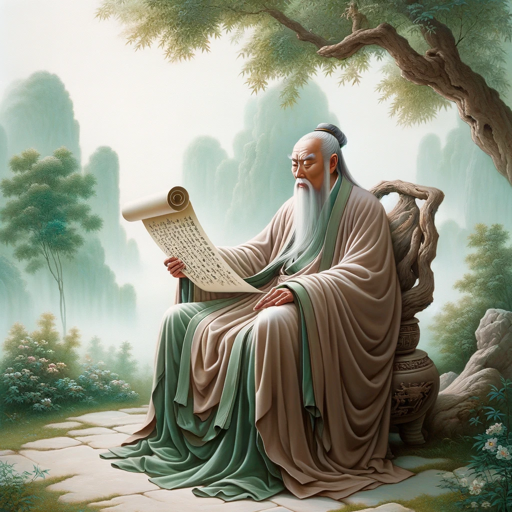
Edda Deck
AI-Powered Presentation Crafting

MidjourneyGPT
AI-powered prompt crafting for creativity.
Según La Biblia - GPT
AI-powered scripture insights & explanations.

Responsive Code Maestro
AI-powered tool for responsive coding solutions

Real Estate Writer Pro
AI-Powered Descriptions for Real Estate

杨超越 (每日必拜)
AI-powered daily blessings from 杨超越.

Draw My Tattoo
AI-powered tattoo design and body visualization

李云龙带你打职场!
AI-powered tactical advice for your career

- Storytelling
- Role-Playing
- World Building
- Campaign Creation
- Combat Simulation
Dungeon Master Q&A
How can Dungeon Master enhance my RPG experience?
Dungeon Master enriches RPG sessions with dynamic storytelling, combat simulations, and NPC management. It provides a seamless way to run campaigns while ensuring your adventures stay engaging and immersive.
Can I create custom characters and worlds with Dungeon Master?
Yes, Dungeon Master allows full customization of characters, classes, and backstories. You can also design unique worlds, integrating personalized lore and geography to suit your narrative.
What role does Dungeon Master play in storytelling?
As the narrator, Dungeon Master guides the adventure, creating challenges and NPC interactions. It presents branching narratives and adapts based on player choices to ensure the story feels personal and exciting.
Is Dungeon Master suitable for solo and group play?
Absolutely. Dungeon Master works well for both solo adventures where players want to explore a world on their own and group sessions where multiple players interact within the same campaign.
What systems or editions does Dungeon Master support?
Dungeon Master supports various RPG systems, including Dungeons & Dragons 2nd Edition, but it can be adapted to other popular RPG systems as well. It allows flexibility in game mechanics to match the player’s preferred system.